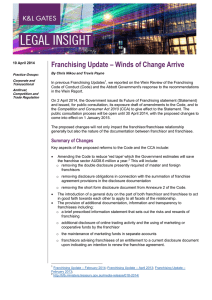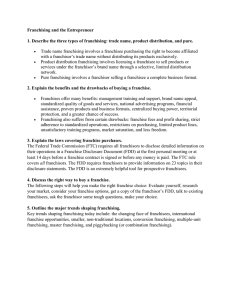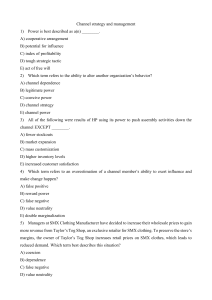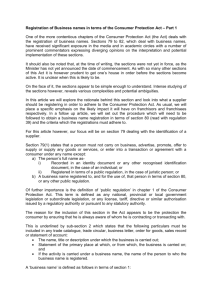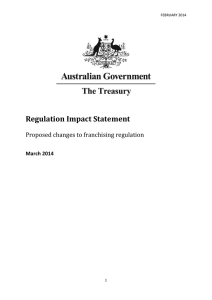Franchising: An Emerging Global Trends
advertisement
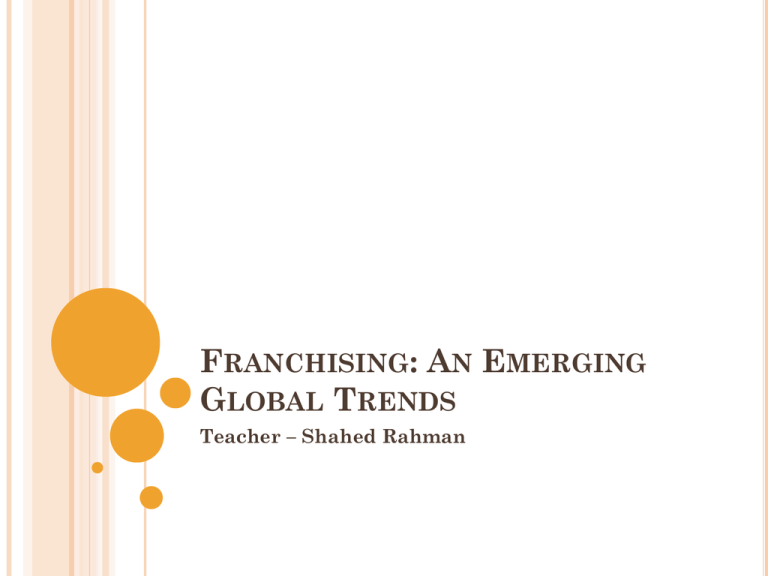
FRANCHISING: AN EMERGING GLOBAL TRENDS Teacher – Shahed Rahman FRANCHISING SYSTEM Franchising is a vertical marketing system in which one firm ( The franchisor) provide another individual or firm ( the franchisee), for consideration, a license privilege to do business in a specified geographic area, along with assistance in organizing training, merchandising, and managment CONSIST OF THREE RELATIONSHIPS Legal Relationship The contract between the franchisor or franchisee The responsibilities and obligation Business Relationship Day to day activities necessary to provide acceptable products and service to customers Franchisee operates the business under the franchisor’s trade name or marketing plan Nonbusiness Relationship Forward looking, cooperative association that exist between two independent channel members Success is tied directly to the success of other Interrelated intrinsically to one another FRANCHISING SYSTEM Franchising Systems consist of network of franchisors and franchisees With in this system franchisees receives the training, guidance, preparations necessary to use trade secrets, operational procedures. BENEFITS OF FRANCHISING Developing the business with less cost Independent owner Rapid market penetration Franchisors do not need to motivate franchisee – as they are the owner of the company Franchisees get an extensive support from franchisors. Proven product o service concept Recognizable brands Standardized methods for operations TYPES OF FRANCHISING Tied-house Franchising Systems Product/Trade name Franchising First generation franchising German brewers in the 18th century contracted with tavern to sell their brand of beer exclusively Second generation appeared during the 19th century Singer sewing machine company elected the sales people to sales its product Distribute a product under franchisor’s trademark Business Format Franchising 20 th Century by A&W Replicate a complete business concept including product or service. CONCERN OF FRANCHISEES Franchising not always confirm profit When contract is over the franchisor can pass to another entrepreneur. Open another store or franchise near your store Independence level Some franchisor just do it for market entry Franchisor collect promotional money from franchisees CONCERNS OF FRANCHISORS Franchisees who decides to buy supplies or equipments from independent sources. Effect franchisors profitability Royalty fees to franchisors Reporting their gross sales honestly Franchisees can hide some of the incident what is bad for the company. Not following the marketing strategies. RELEVANT TRENDS IN FRANCHISING ENVIRONMENT Social, Cultural and Demographic Trends Economic Trends International Trends Industry Trends INTERNAL ENVIRONMENTAL FACTORS Conflicts in Franchising Upfront Fees Tying agreements Capricious Termination Lack of security since franchisors can terminate agreements or fail to renew them at the end of pre specified period Expiration of the term of the contract Franchisee bankruptcy Some default in franchisee’s performance Encroachment Lack of Cooperation PROTECT YOURSELF BY …. Self Evaluation Investing the franchise Studying the disclosure document Checking out the disclosure Questioning earning claims Obtaining professional advice Knowing your legal rights CURRENT LEGAL STANDARDS IN FRANCHISING Disclosure FTC Rule 436 Mandatory Purchases from the Franchisor Termination and Renewal Advertising and Promotions Percentage you have to pay for promotion Expansion Franchisor constantly think of expanding into the market that is already being served MAKING FRANCHISE RELATIONSHIP WORK Strategic Franchise Partnerships Mutual responsibility Communicating up and down Franchisees as customers Leadership and attitude Creating a climate for open communication Commitment to mutual goals Achieve those goals require leadership


